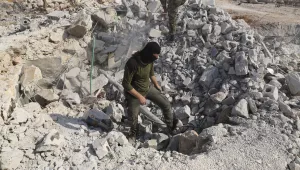The predictability of the sequence of events between Israel and Hizbullah in the last two weeks played out like clockwork. While there are some unknown motivating factors about the Israeli air attack in the Golan Heights on Jan. 18 that killed six Hizbullah men and an Iranian general, there was no such imprecision about the events that followed.
Hizbullah retaliated on Jan. 28 by lethally attacking an Israeli army patrol in the occupied Shebaa Farms region along the Lebanese-Syrian-Israeli borders, and Israeli responded the same day by shelling a range of areas in south Lebanon, killing a Spanish UNIFIL peace-keeper.
For half a day last Wednesday much of the world speculated whether the tit-for-tat attacks would spiral out of control into another full-fledged Israel-Hizbullah war, as happened several times before in recent years. The fact that this has not happened now is an important marker that tells us much about the new mutual deterrence condition that now defines this hostile relationship.
The tit-for-tat attacks did not lead to a full war because of two main reasons, I suspect: They followed the almost scripted sequence of how to conduct such attacks that Israel and Hizbullah signed on to some years ago, and they reveal the significant deterrence on both sides against waging all-out, indiscriminate warfare as they did in 2006, and as Israel and Hamas did last year.
The 1996 understanding and the 2006 UN Security Council Resolution 1701 spell out constraints on both sides’ military attacks, designed to allow them to hit each other’s targets in a limited manner but without destroying civilian infrastructure or killing civilians in population centers. That process worked perfectly this time, as all the attacks either hit military targets or isolated non-populated border regions. Each side retaliated as it said it would. The message from the two mighty warriors Israel and Hizbullah was that they would not allow themselves to be attacked without fighting back, but they would avoid large-scale war and death.
The reason for this must be the massive deterrence pressures that constrain them both from reigniting full-scale war across civilian and military targets. The Israelis know that Hizbullah’s perpetually improving capabilities in rocketry, protecting their launchers, communications, field tactics and other military areas mean that an all-out war would be very costly for some parts of Israel, including possibly shutting down the national airport as happened briefly during the Gaza war. A war also — as happened in previous ones — is unlikely to destroy Hizbullah or wipe out its military capabilities, given its nature as a civilian-based fighting force operating in its own territory. The Israeli population will not support a war of choice that is not required to secure the country from an actual threat.
Hizbullah for its part has to think hard before engaging in another total war against Israel, for similar reasons. Israel would inflict immense damage across all of Lebanon, as it did in 2006, causing large-scale civilian refugee flows and adding to the pressures of the 1.4 million or so Syrian refugees in the country. War would also provide an opportunity for takfiri militants like ISIS and Nusra Front to attack along Lebanon’s northeastern borders, which would be a catastrophic blow to the country. The political condemnations of Hizbullah within Lebanon would also be loud and strong, if it were seen to be waging a war of choice that was not necessary to ward off a real threat or attack from Israel.
This bilateral Israeli-Lebanese equation is rather straightforward and clear, but what makes this latest round of military exchanges fascinating is that it started in the Syrian Golan Heights, which has always been the quietest from with Israel. I have yet to hear a definitive explanation of why Israel attacked the Hizbullah-Iran convoy on the Golan Heights in the first place, though speculation is plentiful.
What we can conclude, I suggest, is that we would not be in this situation had Israel seriously studied and responded to the 2002 Arab Peace Plan that provided an important opening to negotiate a permanent, comprehensive and mutually just peace accord between the Arab states and Israel. Why Israel and the United States both ignored that historic offer remains unclear; what is certain is that Israeli-Lebanese-Syrian-Iranian tensions and active warfare would not be a recurring problem, as in fact they are, had Israel responded to the Arab peace plan.
The capacity of the unresolved Palestine issue to destabilize and radicalize the Middle East region and lead it into recurring wasteful wars is very much in play here. The deterrence condition between Hizbullah and Israel only postpones active warfare, if the underlying causes of the confrontations are not addressed.
Rami G. Khouri is published twice weekly in the Daily Star. He was founding director and now senior policy fellow of the Issam Fares Institute for Public Policy and International Affairs at the American University of Beirut. Follow him on Twitter @ramikhouri.
Khouri, Rami. “Deterrence Works, but Only until War Recurs.” Agence Global, January 31, 2015




